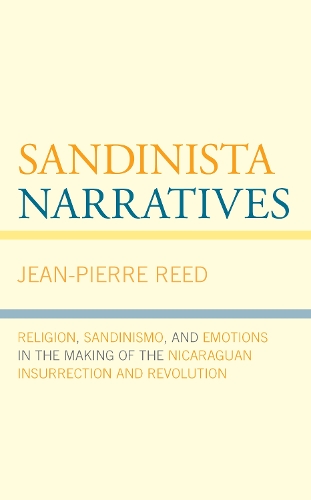
Sandinista Narratives: Religion, Sandinismo, and Emotions in the Making of the Nicaraguan Insurrection and Revolution
(Hardback)
Publishing Details
Sandinista Narratives: Religion, Sandinismo, and Emotions in the Making of the Nicaraguan Insurrection and Revolution
By (Author) Jean-Pierre Reed
Bloomsbury Publishing PLC
Lexington Books
21st October 2020
United States
Classifications
Professional and Scholarly
Non Fiction
General and world history
Politics and government
972.8505/3
Physical Properties
Hardback
328
Width 161mm, Height 227mm, Spine 31mm
680g
Description
This book is an analysis of the role of agency in the Nicaraguan Revolution and its aftermath. The author argues that the insurrection in Nicaragua was shaped by political contingency, action-specific subjectivity, and popular culture. The author also examines how Sandinistan ideology contributed to state-building in Nicaragua while tracing the role of post-revolutionary Sandinism as a political identity.
Reviews
Enrique Oltuski, chronicler of and participant in the Cuban revolution once rightly said, "No book can ever convey the greatness of a people in revolt." Jean-Pierre Reeds magisterial life work, Sandinista Narratives:Religion, Sandinismo, and Emotions in the Making of the Nicaraguan Revolution, is destined to be the book against which that claim is measured.
-- John Foran, University of California at Santa BarbaraSandinista Narratives is one of the most interesting and sophisticated analyses of the subjective side of revolution which I have read. Jean-Pierre Reed emphasizes the importance of emotionsespecially outrage and hopeas well as popular cultural idioms, ideology, and collective identity in Nicaraguas revolutionary process. He makes his case by focusing closely on the personal testimonies of a great many ordinary Nicaraguans as well as activists. This book should interest anyone who wants to understand the role of culture, broadly understood, in the Nicaraguan Revolution and in politics more generally.
-- Jeff Goodwin, New York UniversityReeds clear and compelling text is perhaps our most powerful statement yet on the study of revolution and insurgency that assumes peopletheir ideologies, their emotions, their cultures, and hence the societies they createreally mattered. Deftly interpolating the people of Nicaragua, cultural theorists, students of revolution, and an impressive range of social science and humanistic scholars, Reed finds a narrative that reminds us that in Nicaragua and elsewhere, people, if not always under the conditions of their own choosing, boldly and bravely make their own history.
-- Eric Selbin, Professor of Political Science and Holder of the Lucy King Brown Chair, Southwestern UniversityAuthor Bio
Jean-Pierre Reed is associate professor of sociology, Africana studies, and philosophy at Southern Illinois University.
